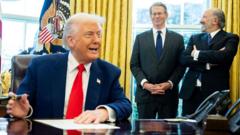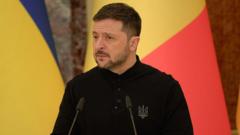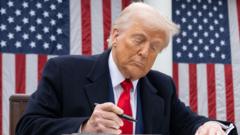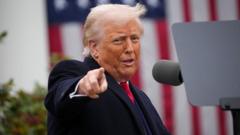With contrasting visions for America's role on the world stage, the upcoming US election could reshape global dynamics. Whether Kamala Harris or Donald Trump emerges victorious, their policies will impact NATO, conflicts in Ukraine and the Middle East, relations with China, and future actions on climate change.
The Impact of the US Election on Global Affairs: A Pivotal Moment for the World
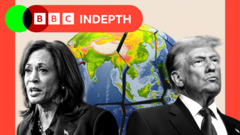
The Impact of the US Election on Global Affairs: A Pivotal Moment for the World
As the US prepares for its presidential election, the outcome holds significant implications for international relations and global conflicts, particularly in Ukraine and the Middle East.
As the United States heads into its pivotal presidential election, the stakes for global stability are unusually high. The world watches closely to see whether Vice President Kamala Harris continues the current administration's course or if former President Donald Trump ascends once more, each promising different visions for America's future role.
During Biden's surprise visit to Kyiv in February 2023, amid the ominous sound of air sirens, he reflected on the US as a "beacon to the world." This sentiment will be tested soon when Americans cast their votes. Harris, with her resolute stance against withdrawal in "these unsettled times," contrasts sharply with Trump, who espouses a doctrine of “Americanism, not globalism.” However, the question remains: how effective can America be in exercising its influence?
Current geopolitical realities are challenging the notion of US primacy. With regional governments forging their own paths and autocratic alliances proliferating, events in Gaza, Ukraine, and beyond raise critical questions about Washington's power. Nevertheless, America still commands significant military and economic resources; therefore, who captures the presidency will undoubtedly influence international relations.
Rose Gottemoeller, former NATO Deputy Secretary General, suggests Trump's presidency could bring turmoil for Europe, calling him “Europe’s nightmare” due to previous threats to withdraw from NATO. The US currently allocates over two-thirds of NATO's total military expenditures. Whether Harris continues Biden's approach or Trump pursues isolationist tendencies will have ramifications for European alliances. Should Harris win, she may strengthen ties with NATO but could face opposition in Congress from a potentially Republican-led House or Senate, complicating her strategy.
In addition, the upcoming election poses challenges for global peace negotiations. Comfort Ero of the International Crisis Group notes the heightened difficulty in resolving conflicts, which have become more complex with the involvement of numerous powers. The ethical consistency of US foreign policy is under scrutiny, affecting its moral authority on crucial issues, such as the Ukrainian war and the Israeli-Palestinian conflict.
Harris has emphasized her unwavering support for Ukraine while also acknowledging the need for humanitarian efforts for Palestinians. Conversely, Trump has hinted at a more lenient approach to Israel, suggesting potential negotiations with Russia over Ukraine that may sideline Ukrainian interests.
On the economic front, Trump's proposed tariffs against China represent a dramatic shift in trade relations that could have international ramifications. While Democrats and Republicans maintain a hawkish stance towards Beijing, Mitter suggests that a Harris presidency might facilitate a more predictable engagement with China, whereas Trump’s unpredictable nature raises the possibility of a more volatile relationship.
Finally, the looming climate crisis adds to the urgency of the US electoral outcome. Mary Robinson, former UN High Commissioner for Human Rights, has stressed the need for decisive climate actions, contrasting Harris’s potential commitment with Trump's prior dismissal of global climate initiatives.
Veteran conflict mediator Martin Griffiths emphasizes the potential moral leadership the US can wield on the world stage. He warns that a Trump presidency might lead to fractured global relationships exacerbated by unilateral decision-making.
As both candidates prepare for the contentious election, their distinct approaches to foreign policy will undoubtedly reshape the global landscape, raising questions about how the US can recover its role as a responsible and principled leader in a time of increasing global tension.


